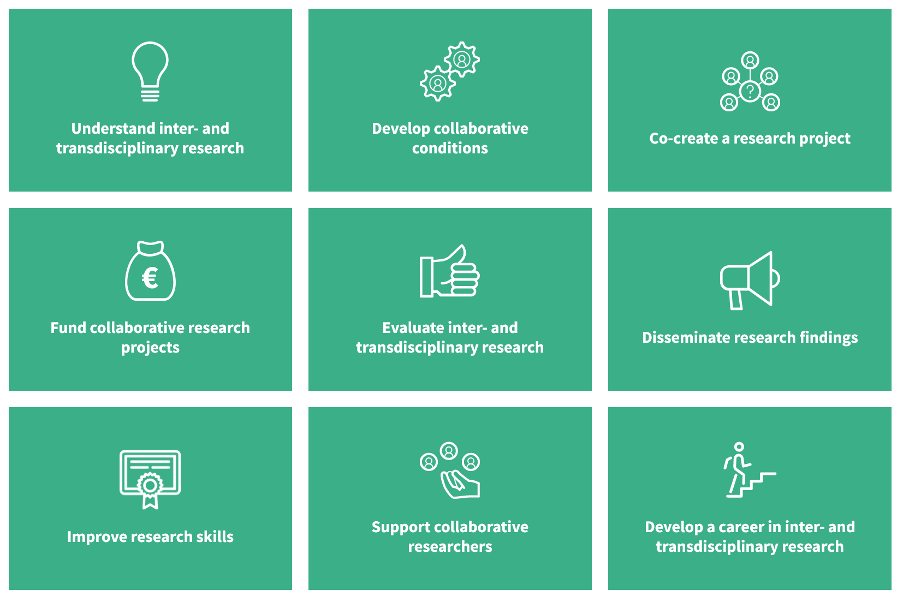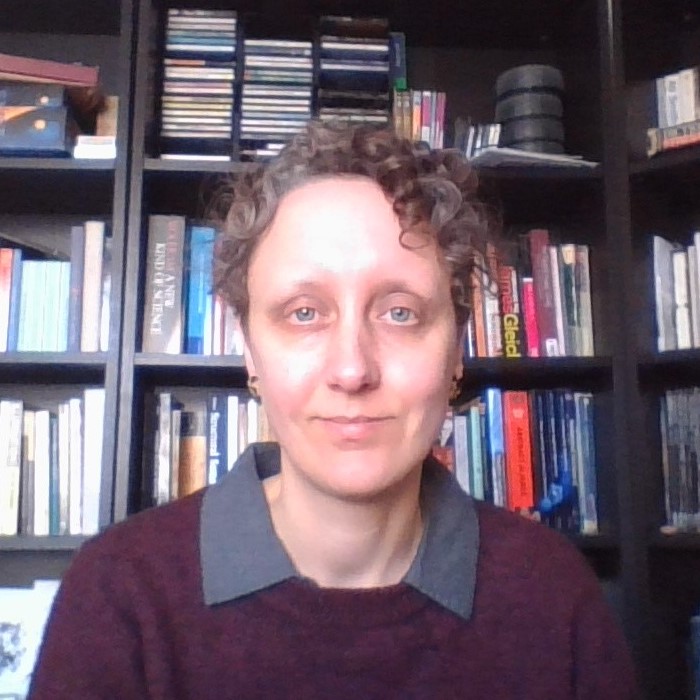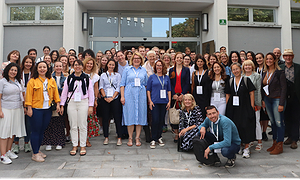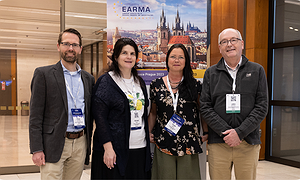What is SHAPE-ID?
SHAPE-ID (Shaping Interdisciplinary Practices in Europe) is a 2.5-year Horizon 2020 Coordination and Support Action, led by Trinity College Dublin, addressing the challenge of improving inter- and transdisciplinary research involving Arts, Humanities and Social Sciences (AHSS) disciplines. The project’s expected impact is to contribute to informing policy on what the European Commission (EC) call Social Sciences and Humanities (SSH) integration. We use the term AHSS to include the Arts and foreground the Humanities, both of which are notably underrepresented in EC SSH-flagged topics and funded projects. Informed by academic and policy literature reviews, a survey with researchers, interviews with policymakers and six stakeholder workshops organised across Europe, the final project output is an online toolkit consisting of resources and guidelines to help different groups undertake or support inter- and transdisciplinary research.
What is the SHAPE-ID Toolkit?
There is widespread acknowledgment that research spanning disciplines and sectors, and increasing the participation of AHSS disciplines, is essential to addressing the complex challenges we face today, from the climate and biodiversity crises to runaway technological development and the recent pandemic – all of which pose socio-cultural as well as technical or scientific challenges. At the same time, such research is difficult and knowledge on how to develop it is fragmentary. The SHAPE-ID toolkit is designed to provide guidance to stakeholders interested in conducting or supporting inter- and transdisciplinary research, including researchers, research organisations, funders, policymakers and societal partners. It acts as a hub for accessing a wide range of available resources – guides, tools, methods, papers, case studies – organised according to goals the project has identified as important to different stakeholder groups, from understanding or co-creating interdisciplinary research to supporting collaborative researchers to funding and evaluating collaborative research. It also provides concise bespoke tools on key topics, including collections of ‘top ten tips’ on different subjects, reflective tools and guides for different users, and case studies illustrating good practice.
How can RMAs use the Toolkit?
RMAs have an important role to play in building capacity for inter- and transdisciplinary research to improve researchers’ ability to participate in such research, develop skills and career paths, and successfully apply for funding, particularly for collaborative projects. RMAs may be interested in exploring the toolkit resources and directing researchers to sections they feel will be useful. Post-award RMAs may find resources on managing an inter- or transdisciplinary project and understanding the challenges that arise useful, while pre-award RMAs may use the toolkit in their efforts to build capacity and support proposal development.
The RMA Guide
We have developed the RMA Guide to offer pre-award RMAs a path through the toolkit based on challenges in supporting researchers to build capacity for inter- and transdisciplinary research, with an emphasis on AHSS integration. The guide highlights these challenges and what we feel are some of the most relevant resources for addressing them. It is organised around two main areas:
Firstly, building a pipeline: how can research support professionals prepare researchers for inter- and transdisciplinary research, by developing skills and leadership, enabling encounters, helping understand career risks and pathways, and promoting interdisciplinarity and AHSS integration within universities?
Secondly, how can they support researchers working on collaborative interdisciplinary proposals, faced with tasks like building a team, working to jointly develop ideas, planning and writing for impact, incorporating the right stakeholders, and considering how integration will take place across the lifetime of a funded project?

The guide directs users to relevant sections within the toolkit, for example:
- Improve research skills includes resources on topics such as accessing training, developing funding proposals, identifying inter- and transdisciplinary tools and methods, and managing inter- and transdisciplinary research projects.
- Develop collaborative conditions includes resources on building relationships across disciplines and sectors and building inter- or transdisciplinary teams.
- Develop a career in inter- or transdisciplinary research includes resources on developing a network and creating a CV for inter- or transdisciplinary research.
- Co-create a research project includes resources on partnering with knowledge co-creators in other sectors, why working with societal partners is important and developing collaborations with creative practitioners, citizens, enterprise and the voluntary sector.
- Understand the roles that AHSS can play and Read inspiring case studies include guides and case studies from other organisations that emphasise the need to include more AHSS perspectives and showcase projects featuring AHSS leadership or participation.
- Our Case Studies collection showcases AHSS leadership in projects, as well as examples of funding and institutional supports and research infrastructures for the AHSS.
Some of the specific SHAPE-ID bespoke tools that may be of interest include:
Further Information
The guide can be accessed and downloaded in PDF form through the Downloadable Guides section of the SHAPE-ID toolkit website.
For more information, please contact the authors of the guide, Maureen Burgess (burgessm@tcd.ie) or Dr Doireann Wallace (doireann.wallace@tcd.ie) at Trinity College Dublin. For more information about the SHAPE-ID project or toolkit, please email info@shapeid.eu.
Acknowledgments
SHAPE-ID has received funding from the European Union's Horizon 2020 research and innovation programme under grant agreement No. 822705. Toolkit development was led by the University of Edinburgh, with contributions from partners Trinity College Dublin, ETH Zurich, the Institute of Literary Research at the Polish Academy of Sciences, ISINNOVA and Jack Spaapen.
[Biographies of authors of the guide and this piece]

Doireann Wallace is an interdisciplinary funding specialist at Trinity College Dublin. She was Project Manager of the SHAPE-ID Horizon 2020 project at the Trinity Long Room Hub Arts and Humanities Research Institute from February 2019 to July 2021. Prior to this she worked as Research Programme Officer in the School of Computer Science and Statistics at Trinity, supporting funding applications for European and national programmes. She holds a BA (Hons) in Photography from Dublin Institute of Technology (DIT), an MSc in Technology and Learning from Trinity College Dublin and a PhD in Media from DIT.

Maureen Burgess has been Research Programme Officer in the Trinity Long Room Hub Arts and Humanities Research Institute, Trinity College Dublin, since autumn 2013. Her main role is to help researchers identify and apply for competitive research funding. Before joining Trinity, Maureen worked in research funding administration roles in the Higher Education Authority (HEA) and the Irish Research Council for Humanities and Social Sciences (now the Irish Research Council). She holds a B Comm (European) with French from University College Cork and a Postgraduate Diploma in international business development from the Dublin Institute of Technology.

 All news
All news






